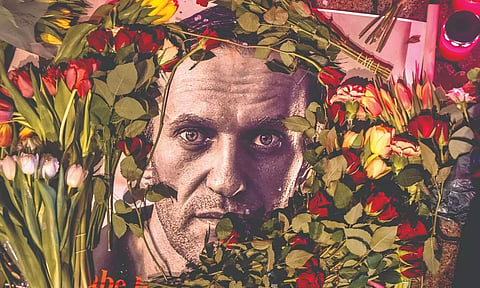

By Anton Troianovski
NEW YORK: Confined to cold, concrete cells and often alone with his books, Alexei A. Navalny sought solace in letters. To one acquaintance, he wrote in July that no one could understand Russian prison life “without having been here,” adding in his deadpan humour: “But there’s no need to be here.” “If they’re told to feed you caviar tomorrow, they’ll feed you caviar,” Navalny, the Russian opposition leader, wrote to the same acquaintance, Ilia Krasilshchik, in August. “If they’re told to strangle you in your cell, they’ll strangle you.”
Many details about his last months — as well as the circumstances of his death, which the Russian authorities announced on Friday — remain unknown; even the whereabouts of his body are unclear. Navalny’s aides have said little as they process the loss. But his final months of life are detailed in previous statements from him and his aides, his appearances in court, interviews with people close to him and excerpts from private letters that several friends, including Krasilshchik, shared with The New York Times.
The letters reveal the depth of the ambition, resolve and curiosity of a leader who galvanized the opposition to President Vladimir V. Putin and who, supporters hope, will live on as a unifying symbol of their resistance. They also show how Navalny — with a healthy ego and incessant confidence that what he was doing was right — struggled to stay connected to the outside world.
Even as brutal prison conditions took their toll on his body — he was often denied medical and dental treatment — there was no hint that Navalny had lost his clarity of mind, his writings show.
He boasted of reading 44 books in English in a year and was methodically preparing for the future: refining his agenda, studying political memoirs, arguing with journalists, dispensing career advice to friends and opining on viral social media posts that his team sent him.
In his public messages, Navalny, who was 47 when he died, called his jailing since January 2021 his “space voyage.” By last fall, he was more alone than ever, forced to spend much of his time in solitary confinement and left without three of his lawyers, who were arrested for participation in an “extremist group.”
Still, he kept up with current events. To a friend, the Russian photographer Evgeny Feldman, Navalny confided that the electoral agenda of former U.S. President Donald J. Trump looked “really scary.” “Trump will become president” should President Biden’s health suffer, Navalny wrote from his high-security prison cell. “Doesn’t this obvious thing concern the Democrats?”
Navalny was able to send hundreds of handwritten letters, thanks to the curious digitalization of the Russian prison system, a relic of a brief burst of liberal reform in the middle of Putin’s 24-year rule. Through a website, people could write to him for 40 cents a page and receive scans of his responses, typically a week or two after he sent them, and after they passed through a censor.
Navalny also communicated with the outside world through his lawyers, who held up documents against the window separating them after they were barred from passing papers. At one point, Navalny reported in 2022, prison officials covered the window in foil. Then there were his frequent court hearings on new criminal cases brought by the state to extend his imprisonment, or on complaints that Navalny filed about his treatment. Navalny told Krasilshchik, a media entrepreneur now in exile in Berlin, that he enjoyed those hearings, despite the rubber-stamp nature of Russia’s judicial system.
“They distract you and help the time pass faster,” he wrote. “In addition, they provide excitement and a sense of struggle and pursuit.” The court appearances also provided him an opportunity to show his contempt for the system. This past July, at the conclusion of a trial that resulted in another 19-year sentence, Navalny told the judge and officers in the courtroom they were “crazy.” “You have one, God-given life, and this is what you choose to spend it on?” he said, according to text of the speech published by his team.
In one of his last hearings, by video link in January, Navalny argued for the right to longer meal breaks to consume the “two mugs of boiling water and two pieces of disgusting bread” to which he was entitled. The appeal was rejected; indeed, throughout his imprisonment, Navalny seemed to savour food vicariously through others, according to interviews. He told Krasilshchik that he preferred doner kebabs to falafel in Berlin and took an interest in the Indian food that Feldman tried in New York.
The court also dismissed his complaint about his prison’s solitary “punishment” cells, in which Navalny spent some 300 days. The cells were usually cold, damp and poorly ventilated 7-feet-by-10-feet concrete spaces. But Navalny was protesting something different: Inmates ordered to spend time in those cells were allowed only one book. “I want to have 10 books in my cell,” he told the court. Books appeared to be at the center of Navalny’s prison life, all the way until his death.
In a letter last April to Krasilshchik, Navalny explained that he preferred to be reading 10 books simultaneously and “switch between them.” He said he came to love memoirs: “For some reason I always despised them. But they’re actually amazing.”
He was frequently soliciting reading recommendations, but also dispensed them. Describing prison life to Krasilshchik in a July letter, he recommended nine books on the subject, including a 1,012-page, three-volume set by the Soviet dissident Anatoly Marchenko.
Navalny added in that letter that he had reread “One Day in the Life of Ivan Denisovich,” the searing Alexander Solzhenitsyn novel about Stalin’s gulag. Having survived a hunger strike and gone months “in the state of ‘I want to eat,’” Navalny said he only now started to grasp the depravity of the Soviet-era labor camps. “You start to realize the degree of horror,” he wrote.